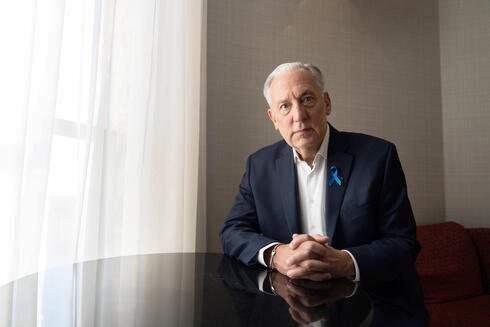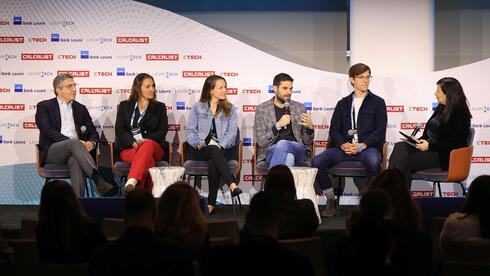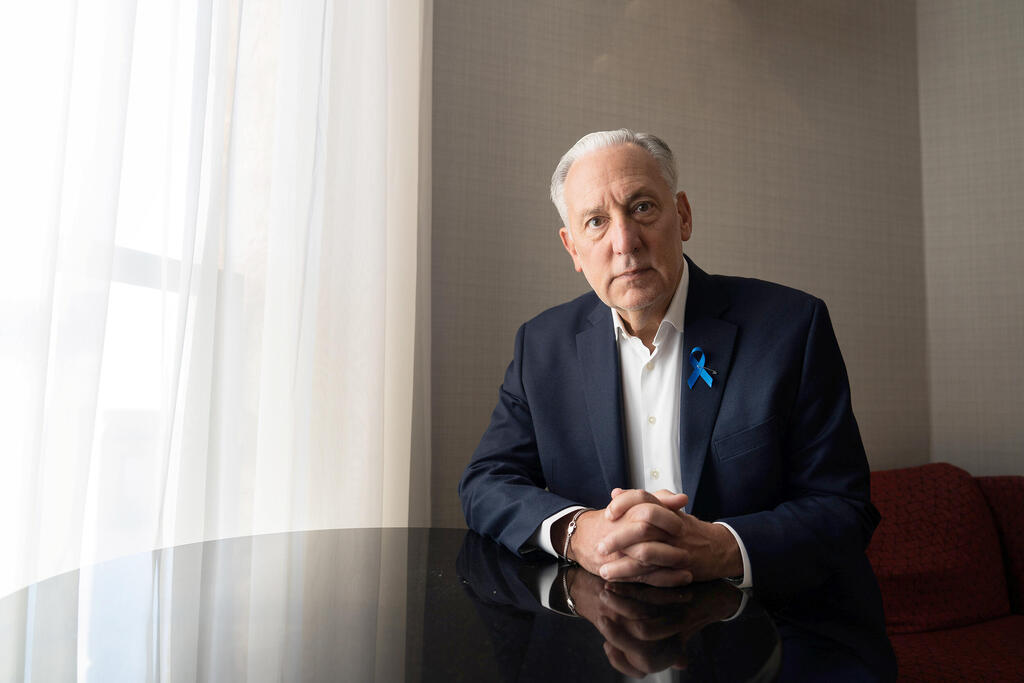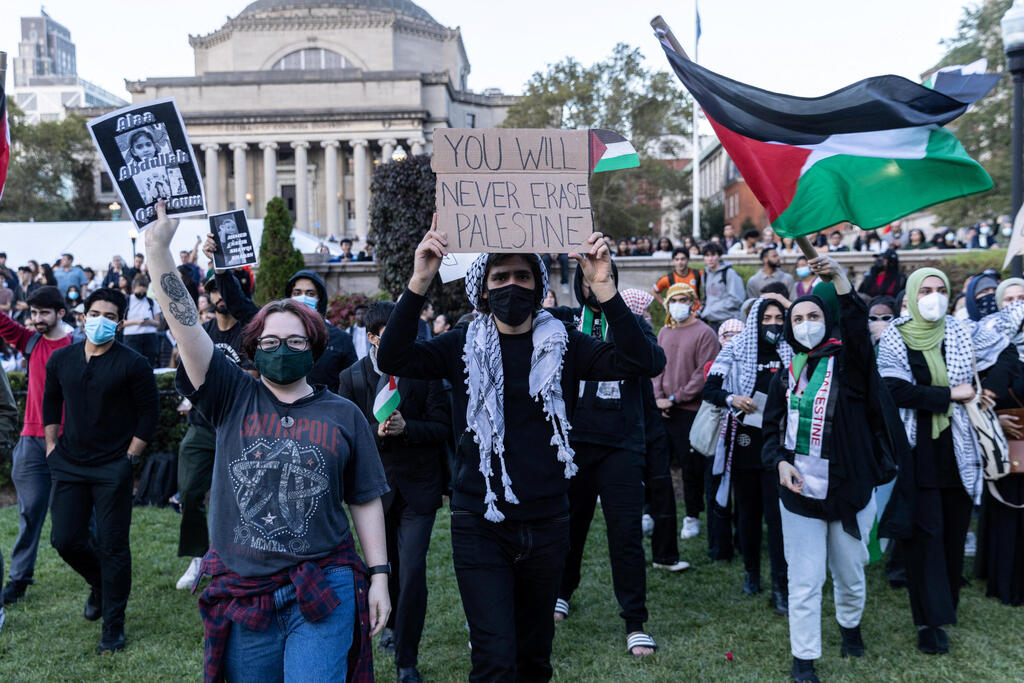
‘The atmosphere on campuses normalizes antisemitism’
Eric Fingerhut found himself serving as president of the Jewish Federations of North America at a historic moment: Hamas’ 7/10 attack and its war with Israel, prompting urgent emergency donations for Israel, which reached an unprecedented $750 million. He spoke to Calcalist about this as well as the subsequent rise in antisemitism, the American Jewish community and the current environment on university campuses.
"I was the CEO of Hillel and I’m familiar with the American higher education system, so I can say with certainty: one can receive a good education in the United States in a welcoming atmosphere without worrying about antisemitism. There is no need to study at elite Ivy League universities like Harvard, Penn, Columbia, and Princeton if they don’t understand the need to protect their students. The fastest way to change the culture that has emerged on campuses is for parents not to send their children to schools that do not maintain a proper atmosphere - and that's what I hope will happen."
Jewish Federations of North America President Eric Fingerhut said this following the highly publicized congressional hearing two weeks ago with the presidents of Harvard, Penn and MIT. A former senator, and long-time leading figure in the American Jewish community, Fingerhut is less known to Israelis and found himself leading one of the largest Jewish organizations in the world, the Jewish Federations of North America, at a historic moment. Since October 7, there has been no return to normal for Jewish communities, in Israel or abroad. The JFNA has raised an unprecedented emergency $750 million in aid for Israel, organized a massive pro-Israel demonstration in Washington DC - the largest pro-Israel or Jewish protest ever held in the U.S. - and has been at the forefront of combating the rise in antisemitism in the United States and Canada.
"Due to antisemitism, people feel they cannot support Israel as they wish or express their Jewish identity," says Fingerhut, "and they feel this at school, on campus, and in the workplace. In a New York public school, for example, students began to chase after a teacher who shared the page 'I stand with Israel,' and she had to be protected by security. On campuses, when there is an anti-Israel protest, the demonstrators choose to stand in front of the Hillel House (the largest Jewish campus organization) and shout threatening, racist chants to students. They have to deal with it almost every day."
Why is this not considered legitimate, in your opinion?
"There are areas on campuses intended for political protest, where demonstrations normally take place - it’s very prominent on campus. But after October 7, anti-Israel protesters don’t go to these areas, instead they conducted their protests in front of Hillel with chants like 'Zionism is racism' and 'From the river to the sea, Palestine will be free.' This is, of course, technically possible because they are allowed to stand on a public walkway, but there need to be higher standards here. Even when it comes to something legal, we can’t have a situation where Jewish students have to be exposed to such behavior."
Why do you think there is currently a rise in antisemitism in the United States?
"Hamas’ attack made antisemites feel that they could come out of the woodwork by hiding behind political protest, claiming that it is in support of the Palestinians."
It’s not?
"No. They claim to care about the humanitarian situation created by the war, and that’s not true because they didn’t care about the humanitarian effects of the Hamas attack.
In addition to protests, where is antisemitism being felt?
"You feel it when students and professionals feel that expressing their Jewishness or support for Israel deprives them of opportunities or harms them in the workplace. This forces us to invest enormous efforts and resources in security because even if not every antisemitic incident is violent, the risk has grown."
‘Israel and American Jews misunderstood how vulnerable we are’
This is Fingerhut's third visit to Israel since October 7. When we meet in Jerusalem, he wears a kippah and wears a necklace expressing solidarity with the hostages in Gaza, bearing the inscription "My heart is held captive in Gaza." He had toured Kibbutz Be’eri earlier that day, and said that everything he read about what transpired there did not prepare him for what he saw. "The burned houses, children's rooms, the scenes where the battles took place. The bodies were already removed but you can still smell and feel what happened. It's terrible, and it's like that house after house."
On October 7, he says, he was in Tel Aviv for Simchat Torah celebrations and was not aware of what was happening because, as an observant Jew, he does not answer the phone on Shabbat. "It took a while until our office manager in Israel reached me to explain what was happening. We immediately started working on both sides of the ocean to organize the emergency fundraising campaign for Israel and, after a few days, I returned to the United States. About two weeks later, I came back here with leaders of Jewish communities to see the full significance of what happened. Each community launched its own fundraising campaign, and we united. Since then, I’ve been eager to come back to see the impact of our work on the ground and also to learn what else needs to be done."
The funds you raised for Israel is the highest amount ever raised by the global Jews community for Israel, and 70% higher than the second highest amount raised during the Second Lebanon War. What prompted the Jewish community to contribute more than usual this time?
"The most important thing for Jewish communities is that Israel is safe and ready to absorb Jews from around the world, and it’s the most natural response to help our brothers."
In the past, there has been conflict between parts of the American Jewish community and Israel regarding the Orthodox monopoly on religion.
"Today, we are 100% focused on supporting the people of Israel, and I hope these issues will no longer divide us because we need to find a way to unite. Look at the huge march we had in Washington on November 14 - all of the branches of the Jewish community took part. We hope that in Israel as well, when the war ends, internal conflicts will cease. It was so disturbing for us, I cannot describe how difficult it was for us to see the division in Israel. It was heartbreaking, and I hope we’ve all learned a lesson from it."
What is the lesson?
"I think Israel and American Jews misunderstood how vulnerable we are; we were too confident. Today, we understand that Israel’s security and the security of American Jews cannot be taken for granted."
Fingerhut refrains from directly referring to the judicial overhaul in Israel, and in response to a question about it, he says, "We’ve realized that we don’t have the luxury to fight over some of the issues that we once fought about. The Jewish community now feels united again, and I think Israelis do too, so make sure that your government’s decisions reflect that."
The conflict before October 7 when the government was advancing the judicial overhaul also had economic implications.
"We’re aware of how investment was impacted by the dispute over the judicial overhaul," Fingerhut says diplomatically. "We were actively trying to help senior Israeli officials understand the impact this had in America. But despite the concern the situation aroused in the Jewish community in America, there was no decrease in philanthropic support from American Jews."
No?
"I admit that there was fear that Israel would fall apart. We were worried when we saw that Israel was becoming so polarized, and we constantly thought about how to unite it. Many of our donors have chosen to invest in Israel, and now there is unity, but for terrible reasons."
Which federations are leading in their contributions to Israel? The New York Federation raised $150 million and other large federations like Chicago raised about $50 million.
"A minimal donation for the global Jewish community is a condition for being a part of the JFNA. New York is the largest federation and leads in donations, as expected, followed by Chicago and Los Angeles, but there are sources of funding from strong communities like Cleveland, Baltimore, MetroWest, New Jersey, South Florida, Miami, Palm Beach, and communities in Canada. Even relatively smaller Jewish communities are very committed to Israel. We raised $750 million, and each community donated much more than we expected."
How is the money transferred to Israel? Close to $6 million have been transferred to the organization Brothers in Arms.
"$250 million have already been transferred to more than a hundred organizations operating here for immediate assistance. The vast majority is designated for the Gaza Envelope, and another part goes to those evacuated from the north. We support, among others, Brothers in Arms, Sapir College, Pitchon-Lev, Latet, the Abducted and Missing Families Forum, rehabilitation hospitals, Asuta, Barzilai and HaEmek hospitals. The government pays for the hotels for evacuees, but there are many other needs. We have a central fund, and beyond that, every federation donates to specific cities. There are many ways in which money reaches the destination."
‘The atmosphere on campuses normalizes antisemitism’
Fingerhut is a third-generation descendant of Eastern European immigrants who arrived in the United States after World War I, a symbol of a generation that successfully settled in the United States, preserving traditional Jewish life. He earned his B.S. in law from Northwestern University and his J.D. from Stanford University, going on to serve as an Ohio state senator and later represent Ohio in the House of Representatives. "As the grandson of immigrants, it was an honor for me to serve in Congress, and I am not unique; there are many with stories like mine," he notes. "I feel that I’m a member of a very fortunate generation of Jews who escaped Europe before the war, built families here, studied, established businesses, and were able to grow in a safe and prosperous environment."
In addition to his political background, Fingerhut also held key roles in American academia as the president of the Board of Trustees of Ohio University in 2007-2011 and later as the CEO of Hillel. His role as president of the JFNA is, in his view, like closing a circle. "I entered politics to make an impact, and I still feel that I have an influential role in the Jewish community and the world," he says. "Today, I can close a circle through our deep involvement in supporting and defending Israel."
According to him, he felt the rise of antisemitism in the United States even during his tenure as CEO of Hillel, "but since October 7, it exploded." The escalation of antisemitism led three presidents of leading American universities, Claudine Gay of Harvard, Liz Magill of the University of Pennsylvania, and Sallie Kornbluth of MIT, to testify before the congressional Committee on Education. The presidents refused to acknowledge that calling for the genocide of Jews constitutes violence and harassment or that such rhetoric violates their universities’ code of conduct, stating that it “depends on the context.” As a result, many donors announced that they would withdraw their donations to the institutions. Additionally, Penn president Liz Magill resigned a week after the hearing.
Why were the university presidents unable to clearly answer a simple question like whether calling for the genocide of Jews violates their institution's code of conduct?
"They live in an academic bubble, and in that context the answer they gave was the right and reasonable thing to say. If this answer had been given in a meeting on campus, they would have been praised for it. The fact that it has been exposed to the outside world is what will bring about change. We have been raising concern about what is happening on campuses for a long time, and you’re always told, 'What could be so bad? It’s Harvard or Penn - elite universities.' But, now suddenly everyone sees. It was a moment that revealed what’s really happening on these campuses, and now people believe you when you say that there’s a problem."
The congressional hearing was an extreme turning point.
"I know what an impact it made in Israel, and you can imagine what it was like in the United States. It also exposes the double standard at universities because we all know that campuses are very sensitive if someone makes an inappropriate remark about another group, yet somehow when someone says something unacceptable about these groups it's a problem but not when making such statements against Jews."
The university presidents who participated in the hearing are certainly not antisemitic.
"They aren’t, but they’re in an environment where antisemitism is normalized. So, even if they don’t make antisemitic remarks themselves, they don’t prevent others from doing so. It's appalling, but it's good that it’s been exposed, and now concrete steps need to be taken to change it. By the way, there is a difference between saying something lawful and saying something moral and just. For example, the protest on public property at Hillel buildings, is it legal? In terms of freedom of expression in the public sphere, it may be. But is that the example we want to set regarding leadership development and how civil society should operate?
"We brought 300,000 people to the huge demonstration for Israel, and the police will tell you that on that day they received more words of thanks than they have received in their entire careers. People stood in line for the busiest day on public transportation in the city without any disturbances or riots, while anti-Israel protests vandalized property, injured people and shouted. Which is the way that we want to conduct ourselves in a democracy and in a civil society? That's what is missing in this legal response. The presidents of the universities gave a legally correct answer, but the question was a moral one, and related to the civil society we want to build and sustain here.
"What is missing here is responsibility. Universities are places of education, institutions that produce future leaders. That's one of the reasons this is so personal for us. Throughout the history of the Jewish diaspora, American society has been the most open and accepting of us. Where else in the world have we been so free and welcome? We helped build America, we’ve had community leaders become senior government officials. We cannot allow this society to become closed, and not just for Jews, so we will do whatever it takes to ensure that American society protects the Jewish people."
Do you have children at elite universities?
"They don’t study at Ivy League institutions.”
Was it a deliberate choice not to send your children to these universities?
“It's not a conscious decision in this case but a personal one, but I feel strongly that what’s taking place at Ivy League universities is very dangerous, and we saw that in the congressional hearing. It needs to be addressed, and our federation will be involved in it."
What do you think donors should do? What about parents?
"Donors need to be clear with universities about their expectations and only contribute if they are satisfied with the responses they receive from the institutions. As for parents, it is important that they be very involved. You can get a good education in many schools in America, but not in universities that don’t understand the need to protect all students from such attacks and harassment. The fastest way to change this culture - even faster than the influence of donors - is for parents not to send their children to schools that do not create and maintain a good atmosphere."
‘The absolute majority of Americans support Israel’
According to data published this month by the Anti-Defamation League, since the Hamas attack, there has been a sharp increase in the number of antisemitic incidents in the United States. Between October 7 and December 7, more than 2,000 incidents were reported (compared to 460 between October and December of last year), including 40 assault cases, 337 acts of vandalism, 749 cases of verbal or written harassment, and 905 demonstrations that included antisemitic rhetoric or support for terrorism against Israel. According to the Anti-Defamation League, this is the highest surge in antisemitic incidents since the late 1970s, when the organization first began to operate.
Is there more immigration to Israel due to the rise in antisemitism?
"In my opinion, there may be some immigration, but not in large numbers, which is why it’s important for us to fight for the character of American society. If there is emigration from the United States to Israel, it will be out of a love for Israel and a desire to help and build it during these times, and in this our federation is involved. Others will simply continue to visit Israel or support this effort financially from abroad."
Is Israel engaged in a lost PR battle in light of the images coming out of Gaza?
"The absolute majority of Americans support Israel's right to defend itself, and when they don't understand, we try to make them understand what happened. Israel does a good job in helping the world understand. The families of the kidnapped came to the United States to tell their stories, and I personally took Gili Roman, whose sister was kidnapped, to meet U.S. senators. The majority understands; the minority is, of course, vocal and receives disproportionate media coverage because that's how things work, but Israelis need to know that our community will work to ensure that American support for Israel doesn’t change."
What do you think of Prime Minister Netanyahu at this time?
"We do not interfere in Israeli domestic politics and have worked with every government in the history of the State of Israel. We are not a political organization but work with every government for the benefit of Israel."
President Biden greatly surprised Israelis with his heartwarming attitude after the attack.
"As Americans, we are very happy about this, and it will be remembered forever. Even before October 7, last summer, President Isaac Herzog presented President Biden with a medal of honor, and I was here then and it was very exciting. Biden's visit to Israel after the attack reminded me that after September 11, British Prime Minister Tony Blair attended President Bush's speech to express solidarity as a close friend, and that will never be forgotten."
Should Israel be concerned about the possibility of Donald Trump’s re-election, given Biden's unfavorable poll numbers?
"The Jewish community is working to ensure that whoever is not elected president will continue to support Israel. I will never forget that at the massive rally we organized in Washington, four congressional leaders - Speaker of the House Mike Johnson, a republican, House Minority Leader Hakeem Jeffries, a democrat, Senate Majority Leader Chuck Schumer, a democrat, and Republican Senate Minority Leader Mitch McConnell, a republican - came together to express support for Israel and held hands. Like Israel before October 7, the United States is polarized, and there is no other issue where leaders of both sides stand with their hands joined before the masses. Israelis need to understand how significant this is and that we will work hard to preserve it."

















